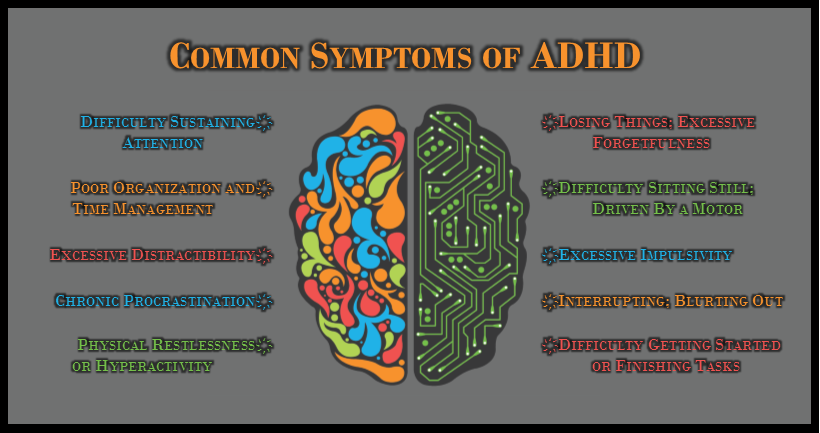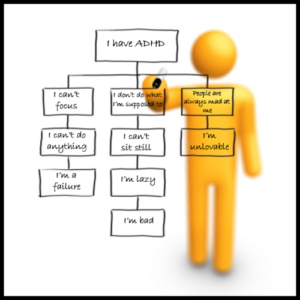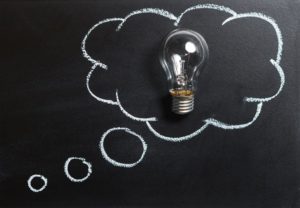ADHD
WHAT IS ADHD?
 Attention deficit hyperactivity disorder (ADHD), is a condition affecting both kids and adults characterized by impulsivity, distractibility, restlessness, and inattention. ADHD is a neurological condition, not just behavioral meaning, that people with this condition actually have differently wired brains than other individuals. Individuals with ADHD have weaknesses in the areas of executive function in their brain. This means that have more difficulty than others in organizing their thoughts, evaluating their environment and behavior, and managing their impulses.
Attention deficit hyperactivity disorder (ADHD), is a condition affecting both kids and adults characterized by impulsivity, distractibility, restlessness, and inattention. ADHD is a neurological condition, not just behavioral meaning, that people with this condition actually have differently wired brains than other individuals. Individuals with ADHD have weaknesses in the areas of executive function in their brain. This means that have more difficulty than others in organizing their thoughts, evaluating their environment and behavior, and managing their impulses.
There is no laboratory test to diagnose ADHD, but it can be diagnosed by a trained mental health professional through a thorough evaluation of the individual’s behavior and family reports. Our experienced therapists can assess for developmental appropriateness of behavior in your child as well. If you or a loved one is suspected of having this disorder it can be assessed in our office without any invasive measures or extensive lab tests.
DO YOU OR YOUR CHILD…
…Struggle to give close attention to details or makes careless mistakes?
…Have difficulty sustaining attention in tasks or play activities?
…Not seem to listen when spoken to directly?
…Not follow through on instructions and fails to finish tasks?
…Have difficulty organizing tasks and activities?
…Avoid or feel reluctant to engage in tasks that require sustained attention?
…Often lose or forget things
…Get easily distracted
…Often fidget or act restless
…Struggle to curb impulsivity
…Chronically procrastinate
…Have poor time management skills
ARE THERE OTHER CHALLENGES FOR THOSE WITH ADHD?
Kids with ADHD are more likely to have certain comorbid disorders including learning disabilities, oppositional defiant disorder, sleep disorders, anxiety, and depression. Individuals with ADHD can be very discouraged which has trickle effects into many aspects of life. Depression, anxiety, and behavioral conditions are particularly understandable if you consider the mistaken core beliefs held by many individuals with ADHD.

HOW DO YOU TREAT ADHD?
 It is important to approach ADHD with a positive strength-based approach. Kids and adults with ADHD often struggle with other conditions such as anxiety which can be increased by the additional challenges they face in daily functioning and the negative responses they get to their behavior from those around them. It takes time and effort to develop the skills that may be easier for others, in order to function effectively despite the disorder. We approach ADHD through a combination of skills training, behavioral therapy, parent coaching (for children), and psychoeducation regarding the condition and effective coping strategies.
It is important to approach ADHD with a positive strength-based approach. Kids and adults with ADHD often struggle with other conditions such as anxiety which can be increased by the additional challenges they face in daily functioning and the negative responses they get to their behavior from those around them. It takes time and effort to develop the skills that may be easier for others, in order to function effectively despite the disorder. We approach ADHD through a combination of skills training, behavioral therapy, parent coaching (for children), and psychoeducation regarding the condition and effective coping strategies.
Individuals with ADHD may have behaviors that earn them disapproval and even constant criticism. Many have dealt with failure in their academic life as well leading to significant discouragement and low self-esteem. We treat the whole person and help individuals to recognize their unique gifts and self worth. These individuals have unique challenges, but that doesn’t mean they can’t be successful and even thrive in their studies, work, and relationships.
Negative Core beliefs are a major source of stress for many who struggle with ADHD. If you have been unsuccessful or struggled in many areas of life from a young age; it makes sense that you might develop negative beliefs about yourself that extend beyond thoughts about your ADHD symptoms. Let’s imagine this lifelong negative thought train might go something like this…
I have ADHD and that means I’m not as good as the other kids…
My teachers don’t like me…
Studying is incredibly difficult for me…
I must not be very smart…
My grades are disappointing to my parents…
This should be easy for me to do; I must be lazy…
People tell me I don’t reach my potential…
People tell me I’m disorganized….
People tell me I don’t follow through…
I’ve had issues with bosses getting frustrated with my performance, I must be incompetent…
My partner has expressed frustration with me, I don’t know how to fix this…
Maybe I’m unlovable…
I’m depressed, anxious, angry, rejected, broken…
When we treat ADHD; it’s important to go beyond the surface. While we do provide behavioral strategies to help you cope with day to day challenges, we also help you dig in to the lies you may believe about yourself to help you find freedom as a person. Your condition does not limit your worth or ability; you simply need some support and to skills to help you more effectively tackle life.
HOW CAN PARENTS HELP?
Parents can help their kids through a number of ways including: increasing their understanding of the condition and limits or difficult areas for their child; coaching the child in their skills development and impulse control; advocating for the child in medical and academic settings, encouraging their child; and playing therapeutic games and connecting with their child. One of the most fun parts of working with your kids is playing with them in a way that helps them address their challenges. Many standard family games can be used therapeutically to develop attention and impulse control skills including: Operation, I spy, Jenga, and memory just to name a few.
WHAT ABOUT MEDICATION?
There is a lot of controversy surrounding medication for ADHD in particular with children. Many parents do not feel comfortable considering this option with their kids or want to explore it only as a last resort. We understand this hesitation and we can certainly help with therapeutic interventions and/or parent coaching regardless of your decisions about medical treatment. Ultimately, we support your rights as an individual and a parent to choose what you feel is best for you and your family.
Medication works for many individuals struggling with ADHD and can be prescribed from a medical doctor or psychiatrist of your choosing. While we do not prescribe in our office we can help you with referrals and ongoing therapeutic support if this is a route you choose to take.
